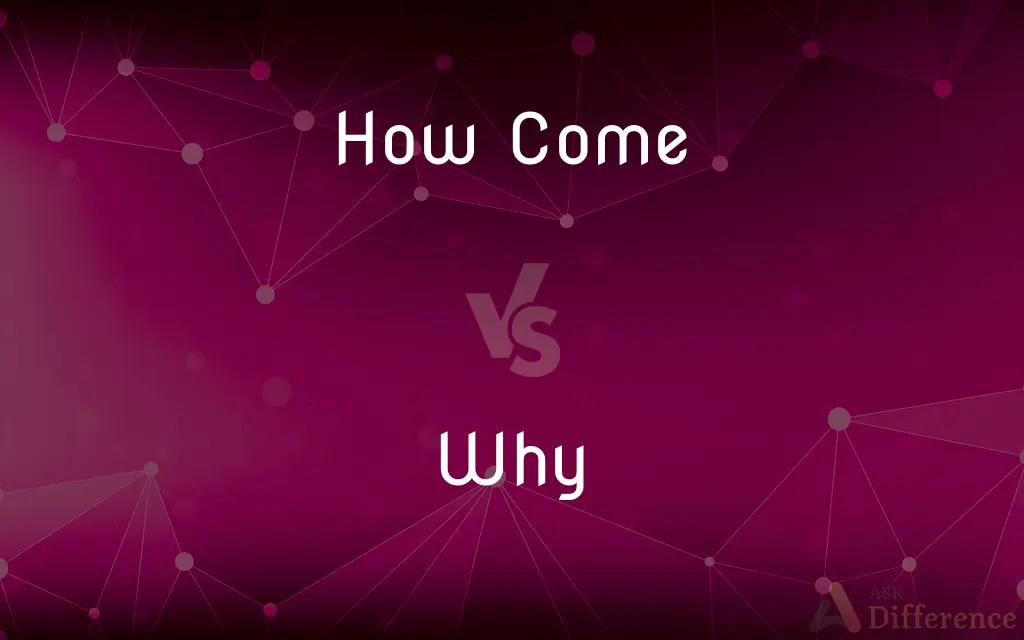How Come vs. Why — What's the Difference?
By Tayyaba Rehman — Published on November 3, 2023
How Come is a colloquial phrase asking for explanation; Why is a formal interrogative asking the reason or purpose.

Difference Between How Come and Why
Table of Contents
ADVERTISEMENT
Key Differences
"How Come" and "Why" are both used to inquire about reasons or explanations. However, their usage, tone, and formality differ. "How Come" is a more informal and conversational way of seeking an explanation. Its origins are in everyday speech, often seen in casual dialogue. On the other hand, "Why" is a standard English word, used across both formal and informal contexts. It's universally recognized and serves as an essential interrogative.
"How Come" can be seen as a phrasal alternative to "Why." Even though they seek similar answers, the former might be perceived as softer or less direct. This is because "How Come" seems to inquire more about circumstances leading to an event. "Why," being succinct and direct, often seeks a straight reason or justification for something.
Grammar is another arena where "How Come" and "Why" differ. "How Come" usually leads to a statement structure in the subsequent sentence, like "How come he is late?" Contrast this with "Why," which might lead to an auxiliary verb, as in "Why is he late?"
In essence, while both "How Come" and "Why" aim to understand the cause or rationale behind something, they are distinguished by their formality, tone, and subsequent sentence structure. Using one over the other can subtly change the tone of inquiry.
Comparison Chart
Formality
Informal
Both formal and informal
ADVERTISEMENT
Tone
Conversational, softer
Direct, straightforward
Structure
Leads to a statement structure
Can lead to auxiliary verb structure
Usage
Mostly in spoken American English
Universal in both speech and writing
Purpose
Asks about circumstances leading to an event
Directly asks for reason or justification
Compare with Definitions
How Come
"How Come" is a softer alternative to directly asking "why."
How come he gets to go and I don't?
Why
"Why" is universally recognized in both formal and informal contexts.
Why is the sky blue?
How Come
"How Come" is often used in casual American English conversations.
How come she looks so happy?
Why
"Why" directly inquires about justification or rationale.
Why should I believe you?
How Come
How Come" is a colloquial inquiry into reasons.
How come you didn't call me?
Why
"Why" can be accompanied by auxiliary verbs in questions.
Why have you been avoiding me?
How Come
"How Come" usually leads to a statement structure in questions.
How come the store is closed?
Why
"Why" is used to probe deeper into causes or motives.
Why are you sad?
How Come
"How Come" seeks understanding of circumstances.
How come it's so cold today?
Why
For what purpose, reason, or cause; with what intention, justification, or motive
Why is the door shut? Why do birds sing?.
Why
The reason, cause, or purpose for which
I know why you left.
Why
Usage Problem On account of which; for which.
Why
The cause or intention underlying a given action or situation
Studying the whys of antisocial behavior.
Why
A difficult problem or question.
Why
Used to express mild surprise, indignation, or impatience.
Why
(interrogative) For what cause, reason, or purpose.
Why
Introducing a complete question.
Why is the sky blue?
Why did you do that?
I don’t know why he did that
Tell me why the moon changes phase.
Why
Introducing a verb phrase (bare infinitive clause).
Why spend money on something you already get for free?
Why not tell him how you feel?
Why
Introducing a noun or other phrase.
Why him? Why not someone taller?
Why
(relative) For which cause, reason, or purpose.
That's the reason why I did that.
Why
(fused relative) The cause, reason, or purpose for which.
That is why the sky is blue.
Why
Reason.
A good article will cover the who, the what, the when, the where, the why and the how.
Why
An exclamation used to express pleasant or unpleasant mild surprise, indignation, or impatience.
Why, that’s ridiculous!
Why, how kind of you!
Why
For what cause, reason, or purpose; on what account; wherefore; - used interrogatively. See the Note under What, pron., 1.
Turn ye, turn ye from your evil ways; for why will ye die, O house of Israel?
Why
For which; on account of which; - used relatively.
No ground of enmity between us knownWhy he should mean me ill or seek to harm.
Turn the discourse; I have a reason whyI would not have you speak so tenderly.
Why
The reason or cause for which; that on account of which; on what account; as, I know not why he left town so suddenly; - used as a compound relative.
If her chill heart I can not move,Why, I'll enjoy the very love.
The how and the why and the where.
Why
A young heifer.
Why
The cause or intention underlying an action or situation, especially in the phrase `the whys and wherefores'
Why
Question word; what is the reason (`how come' is a nonstandard variant);
Why are you here?
How come he got an ice cream cone but I didn't?
Why
"Why" is an interrogative word asking for reasons.
Why did you do that?
Common Curiosities
Are "How Come" and "Why" interchangeable?
Often, yes, but "How Come" is more informal and conversational than "Why."
Why does "How Come" lead to a statement structure?
It's a quirk of its colloquial origin, aligning more with conversational flow.
Where did the term "How Come" originate?
It's derived from spoken American English and has colloquial roots.
Can I use "How Come" in formal writing?
It's best to use "Why" in formal contexts and reserve "How Come" for casual conversations.
Do all cultures understand "How Come"?
While many might, "Why" is more universally recognized.
Are there situations where "How Come" is preferable over "Why"?
In casual settings where one wants to sound softer or less confrontational, "How Come" might be preferable.
Is "Why" more direct than "How Come"?
Generally, yes. "Why" is more straightforward in seeking reasons.
Does "Why" always need an auxiliary verb?
No, but it often can be accompanied by one, e.g., "Why are you here?"
Can "How Come" be used in professional settings?
While understood, it's best to use "Why" in professional or formal settings.
Is "How Come" slang?
It's not slang, but it's a colloquialism primarily used in informal speech.
Which is older: "How Come" or "Why"?
"Why" is older, with origins in Old English, while "How Come" is a relatively recent colloquialism.
How do I decide between "How Come" and "Why"?
Consider your audience and setting. "Why" is universally appropriate, while "How Come" is best for casual contexts.
Why does "How Come" sound softer?
Its phrasal nature and alignment with conversational English give it a less direct tone.
Can I start a sentence with "Why" in formal writing?
Yes, starting with "Why" is acceptable in both formal writing and speech.
Why is "Why" used in so many languages?
"Why" or its equivalent is fundamental to human inquiry and exists in most languages to question reasons or causes.
Share Your Discovery
Previous Comparison
Silicon Diode vs. Germanium Diode
Next Comparison
FBI vs. US MarshalAuthor Spotlight
Written by
Tayyaba RehmanTayyaba Rehman is a distinguished writer, currently serving as a primary contributor to askdifference.com. As a researcher in semantics and etymology, Tayyaba's passion for the complexity of languages and their distinctions has found a perfect home on the platform. Tayyaba delves into the intricacies of language, distinguishing between commonly confused words and phrases, thereby providing clarity for readers worldwide.













































